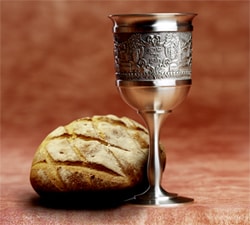One of the names for this meal is the Eucharist. That name comes from the Greek verb for giving thanks—eucharisto.

Now of course, the center of our thanksgiving should be directed toward God for His indescribable gift—the death and resurrection of His Son for our salvation. But this is the kind of thanksgiving which, if it is genuine, overflows into everything else. If we are truly grateful for our salvation in Christ, then we will naturally overflow with thanks for all God’s gifts to us.
The kindergarten of thanksgiving has to do with the material blessings we enjoy. We are grateful for our food, for health, for shelter, for medical care. These are good things, and we recognize that we need them in our requests, and we show our gratitude when we say grace over our meals.
Progressing through the curriculum of gratitude, we then need to learn how to thank God for the people in our lives—because we are tempted to take them for granted, taking them as fixtures. Thank your mom for all the work she does. Thank your father. After a lesson at school, thank you teacher. Out loud, thank your teacher. Thank the deacons who put this service together, and do it often. Thank the preacher for the message. Do it often enough that it gets woven into our culture. We want our culture to be characterized by gratitude.
The graduate school of gratitude is learning to thank God for our afflictions. This is where the priceless lessons are. “It is good for me that I have been afflicted; That I might learn thy statutes.” (Psalm 119:71).
And this brings us full circle. It was the affliction that Christ endured on our behalf that makes it possible for us to love our Father, and to love one another.
So come, and welcome, to Jesus Christ.

